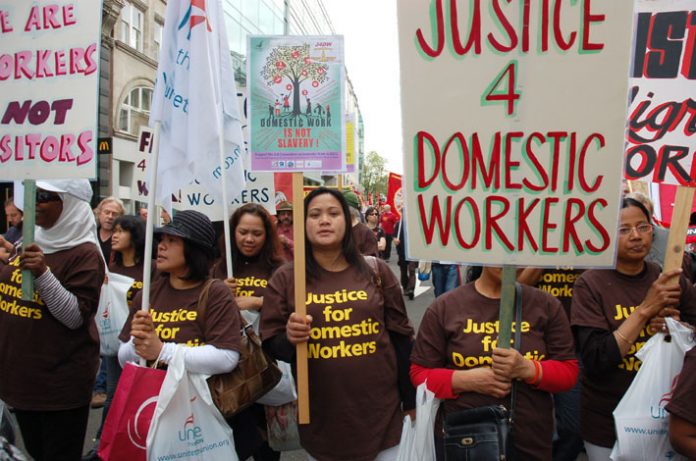CONTRARY to Tory Chancellor Osborne’s claims that his Emergency Budget is ‘fair’ and ‘progressive’, it is actually unfair and regressive, hitting the poorest hardest.
That is the warning being made by the Institute for Fiscal Studies (IFS), which said Osborne’s Budget signals the ‘longest and deepest-sustained cuts to spending on public services since at least World War Two’, with at least six consecutive years of cuts.
This will wipe out all the gains of the Welfare State since 1948.
The IFS said that if only 10 per cent cuts are made to ‘protected’ budgets like the military, then cuts of 33 per cent in things like housing and university spending – not the 25 per cent advertised – would have to be made.
Osborne said in his Budget statement on Tuesday that his package ‘protects the most vulnerable in our society.’
But the IFS found that, while the poorest 10 per cent of society would have been left almost untouched by the last Budget of the Labour government in March, the first Budget of the Tory government this week will cut their incomes by an average of more than 2.5 per cent by 2015.
In contrast, the IFS found that the richest 10 per cent of people will be only 0.5 per cent worse off under the Tories.
Housing charities have also warned that tens of thousands will face eviction in London and other higher rent areas as a result of cuts to housing benefits announced by Osborne.
The IFS director Robert Chote said: ‘Perhaps the most important omission. . . is the impact of the looming cuts to public services, which are likely to hit poorer households significantly harder than richer households.’
Chote added that Osborne and Liberal Democrats leader Clegg have been keen to describe these measures ‘as progressive in the sense that the rich will feel more pain than the poor.’
But Chote said: ‘The budget looks less progressive – indeed somewhat regressive – when you take out the effect of measures that were inherited from the previous government, when you look further into the future than 2012-13, and when you include some other measures that the Treasury has chosen not to model.’
More cuts will take effect from April 2013, for example a 10 per cent cut in housing benefit for JSA claimants who have been unemployed for more than a year.
The IFS’s Mike Brewer said Osborne’s decision to link almost all benefits, tax credits, state second pensions and public service pensions to the Consumer Prices Index (CPI) would cut £5.8 billion from spending on social security and pensions alone.
(Unlike the Retail Price Index that unemployment benefits and pensions are currently linked to, the CPI excludes most housing costs).
Chote added: ‘Mr Osborne has long argued that international experience recommends dividing a fiscal consolidation 80:20 between spending cuts and tax increases.
‘The measures announced by Mr Osborne yesterday split 80:20 by 2014–15 and 85:15 by 2015–16.
He compared this split with the ‘Clarke and Lamont budgets of 1993 whcih aimed for a roughly 50:50 split between spending and tax.’ He added that Osborne’s ‘degree of reliance on spending cuts implies some very tough decisions.
‘The government has identified welfare cuts worth £11 billion by 2014–15.
‘More than half come from indexing benefits to an inflation rate that tends to be lower than the ones currently used.
‘Mr Osborne implicitly assumes that recipients were overcompensated for increases in the cost of living in the past. . . The rest comes largely from the four biggest working-age benefits and tax credits, a mixed bag of reforms with no consistent objective beyond the desire to save money.’
Turning to spending on public services, Chote said: ‘In total, the cut in central government public services spending as a share of national income now planned by the Coalition will more than reverse the entire increase we saw under Labour.
‘We are looking at the longest, deepest sustained period of cuts to public services spending at least since World War Two.’
On the tax side, said Chote, the Budget ‘added up to an £8 billion net tax increase in 2014–15, but this comprised roughly £20 billion of tax increases offset by roughly £12 billion of tax cuts.
‘When Mr Osborne said that “the years of debt and spending” made the £13 billion increase in VAT unavoidable you might just as well say it was his desire to cut other taxes that made it so.’
Chote said raising VAT ‘will now do more to distort people’s spending decisions, so that they can buy fewer of the goods and services they want for every pound they spend.’
Chote said it was ‘not immediately obvious’ that the Emergency Budget promoted ‘simplicity’ or ‘set out a long-term strategic vision for the tax system’.
James Browne, IFS research economist, said the government’s plans ‘hit the poorest hardest and indeed keep on hitting them more and more every year’.
